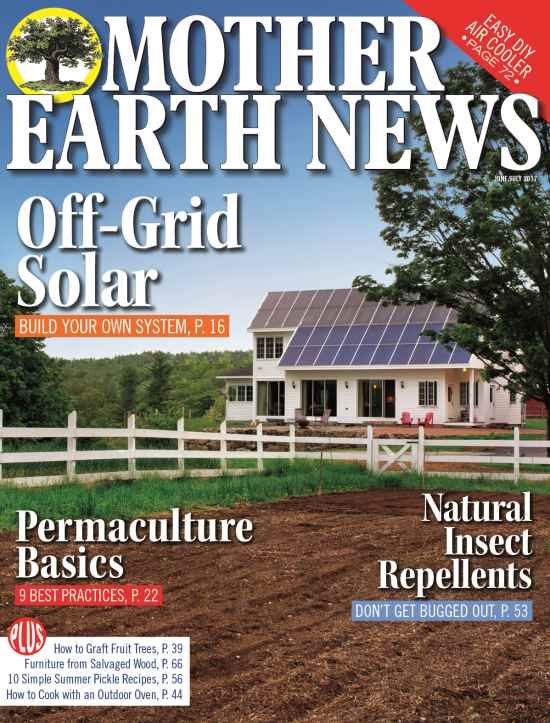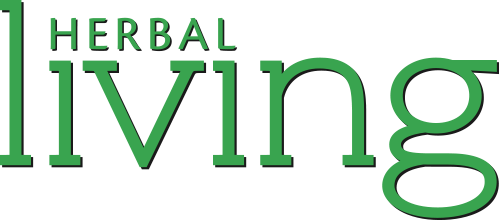From June to August, Ben and I participate in a local Farmers Market called Downtown Rising in Plattsburgh, NY. As some of you may know, a lot goes into a Farmers Market. Generally the week before is the time to make and prep new products for the following weekend. Friday evening can be a late night followed by an early morning hustle to get to the Market to set up. While I find participation in a Farmers Market to be an excellent way to sell our products in the summer months and to advertise our newly established business, I have found that there is so much more to being in a Farmers Market. My hope for this post is to encourage and provide a new outlook on Markets to new farmers, weathered farmers, and readers that may not have a farm but want to look for ways to support their local cities. I hope these words can be taken to heart, and that you begin to see the fullness of Market life in your community and how it reaches beyond just taking a stroll through a Market each week.
My first Farm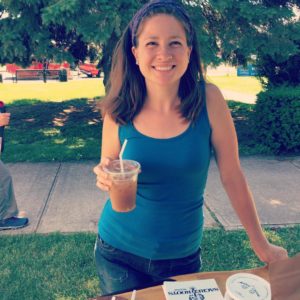 ers Market takeaway is the concept of relationship building amongst communities. These communities are established in relationships built with the customers passing through, and also the relationships with the vendors from local farms. It has been such a joy to meet new people at the Farmers Market, and then see that they decided to visit our Maple Farm during sugaring season. We have been blessed to have a loyal group of customers that are not just buying from us for our maple (although they say they enjoy it), but because of the relationships we built with each and every one of them. This is why we do what we do, and continue to have the energy to keep on when the farm life gets stressful. The community amongst vendors is also rich. At almost every Market I have amazing conversations. One of my absolute favorite things to do is trade or barter products. I’m convinced that I could live my life trading goods. It’s not uncommon for me to trade my maple for fresh greens, or a delicious loaf of bread, or whatever else I may need that week. There’s something so organic about sharing with my community what I can make from my own land, to then receive what they have made from their land. On days when the Market may be slow, or perhaps sales weren’t what I anticipated, it’s these communities we’ve formed that make it worthwhile.
ers Market takeaway is the concept of relationship building amongst communities. These communities are established in relationships built with the customers passing through, and also the relationships with the vendors from local farms. It has been such a joy to meet new people at the Farmers Market, and then see that they decided to visit our Maple Farm during sugaring season. We have been blessed to have a loyal group of customers that are not just buying from us for our maple (although they say they enjoy it), but because of the relationships we built with each and every one of them. This is why we do what we do, and continue to have the energy to keep on when the farm life gets stressful. The community amongst vendors is also rich. At almost every Market I have amazing conversations. One of my absolute favorite things to do is trade or barter products. I’m convinced that I could live my life trading goods. It’s not uncommon for me to trade my maple for fresh greens, or a delicious loaf of bread, or whatever else I may need that week. There’s something so organic about sharing with my community what I can make from my own land, to then receive what they have made from their land. On days when the Market may be slow, or perhaps sales weren’t what I anticipated, it’s these communities we’ve formed that make it worthwhile.
Another part to Market life that I find rewarding is what the essence of the Market represents. It’s an open space filled with local fresh food and goods. By setting up together, we bring together members of the community, allowing for organic conversations to occur. Our Farmers Market has live music each week. Visitors get the chance to hear local music, see the faces behind the food they put in their body, and meet people from the community that they otherwise may not have ever connected with. It’s a completely organic and natural way to do community. Not only that, by going to a Market, families can park their car in one location and load up on a lot of what 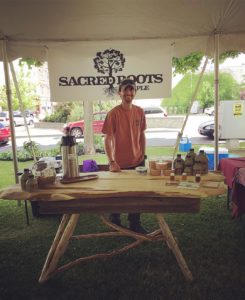 they may need for that week. This helps eliminate the need to bounce all over the city for food, which results in more emission of chemicals in the air. Buying at Markets also helps to know that the food is being grown naturally and often times without harsh chemicals that are damaging to one’s body, the animals we ingest, and our earth. Ben and I are certainly guilty of not always shopping local, so I am by no means judging. Depending on the size of your city, buying everything you need for a week could be nearly impossible. We are from a very small city. We can certainly find a lot at our local Markets, but we tend to make stops to a local co-op or grocery store. The key isn’t to change your entire lifestyle drastically by only eating at a Market, but to try and take small steps to do your part.
they may need for that week. This helps eliminate the need to bounce all over the city for food, which results in more emission of chemicals in the air. Buying at Markets also helps to know that the food is being grown naturally and often times without harsh chemicals that are damaging to one’s body, the animals we ingest, and our earth. Ben and I are certainly guilty of not always shopping local, so I am by no means judging. Depending on the size of your city, buying everything you need for a week could be nearly impossible. We are from a very small city. We can certainly find a lot at our local Markets, but we tend to make stops to a local co-op or grocery store. The key isn’t to change your entire lifestyle drastically by only eating at a Market, but to try and take small steps to do your part.
The conversations, relationships, live music/entertainment, and doing good for the environment has one overarching theme: community. I know in our city, one of the goals is to bring more residents downtown to support local business and take pride in what our city offers. This requires work on the individual to step away from their individual schedule and individual desire, and take on the community mindset. According to Bill McKibben in his book titled Deep Economy: The Wealth of Communities and the Durable Future,
In a changed world, comfort will come less from ownership than from membership. If you’re a functioning part of a local community that can meet at least some of its needs-for food, for energy, for companionship, for entertainment, for succor – then you’re more secure. Localism offers a physically plausible economy for the future, and a psychologically plausible one as well: an economy that might better provide goods like time and security, which we’re short of (2007).
As a farmer and a graduate student studying counseling, I can’t help but want to dive more into investment with my community. It shifts the focus off my self, off my farm, and off my abilities, and places the focus on how we, as a community, can bring together our unique gifts and offerings to build into one another, our community and our world.
I hope that this provided some encouragement to the benefits of being plugged into a local Farmers Market, whether you’re a vendor or a customer. We all play vitals roles in sustaining our communities. Join me as we take small steps to make big changes.
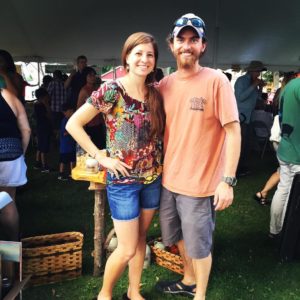
Me & Ben at Downtown Rising!





